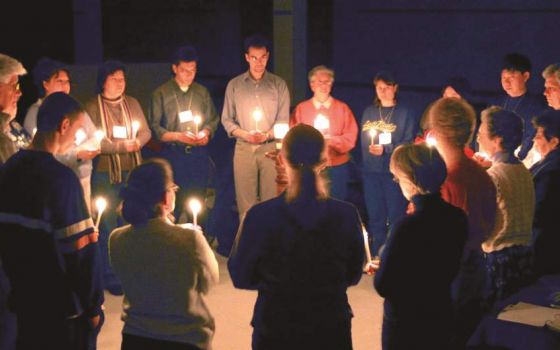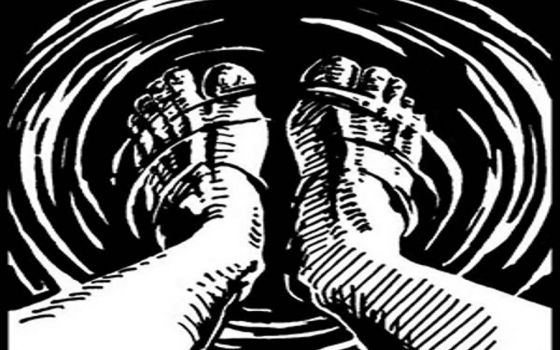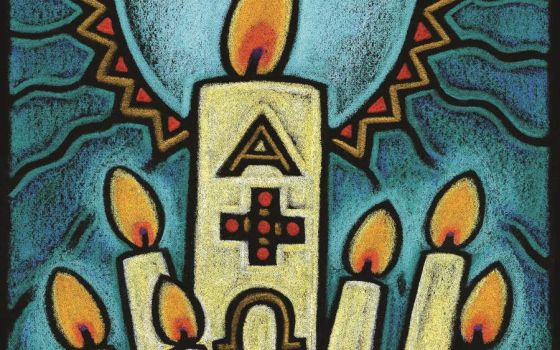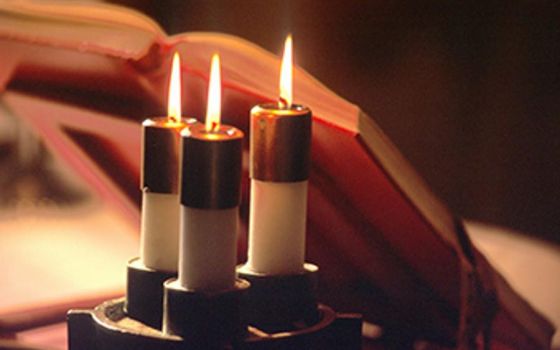
(Julie Lonneman)
Lent is Advent's poor relation. But its poverty offers Christians great riches. So far, Walmart hasn't figured out a way to fill the aisles with Lenten merchandise. A plastic Minion figurine peering out of his oversized glasses while holding a plastic image of the crucified Christ doesn't offer many marketing or spin-off possibilities. "O Sacred Head Surrounded" wafting from the loudspeakers in early spring doesn't really make anyone want to buy another cell phone or more under eye concealer.
No one has yet figured out a way to create a counterpart to the "Elf on the Shelf" (perhaps "Judas on the Shelf") to encourage naughty children to be good in hopes of finding a basket filled with goodies on Easter Sunday morning. Even "The Passion of the Christ," Mel Gibson's attempt to create a mass-market Lenten movie, won't be showing up on the massive screens that line the walls of the nation's electronic departments. Scourging scares away the customers.
So, Christians, rejoice! It's Lent all this March long.
Teachers speak of the "Lenten tripod" of prayer, fasting and almsgiving. I always think of the wooden stools my grandfather built and painted and gave out to the mothers in the family to use in their kitchens. The stools had three legs and they were sturdy and true. I still have and use one, though it's now probably seventy years old. But if one of the legs were to be cut off, the stool could not hold any weight. It would wobble and tip and anyone trying to stand atop it would fall. Our Lenten practices together hold us up, support us and help us to reach up to Easter and the resurrection.
Prayer, fasting and almsgiving — like the Trinity — make a seamless whole. But for me — living as I do in a time and a place where it is never quiet, never not "LED-lit," where it is never truly dark, except perhaps in our overstuffed souls — the opportunity the church offers for prayer, for stillness, for time in "the watches of the night," is a gift. Let's receive it and accept its abundance.
One simple practice is to take the Advent candles, strip away the greenery and place them, unadorned, on a table or shelf where you can sit or stand each day in prayer. A model for our prayer in these days might be found in the so-called cursing psalms, psalms so violent in their cries for vengeance against David's foes that we recoil, even as they speak to our own vengeful hearts. We are all familiar with the haunting opening lines of Psalm 137:
By the rivers of Babylon
there we sat weeping
when we remembered Zion.
But few rarely remember how it ends, a cry for the destruction of Babylon:
Blessed the one
who seizes your children
and smashes them
against the rock.
We recoil, in part, because the heads of Babylonian children are, this day, being smashed against the rocks. How then can these words lead us deeper into prayer? David isn't trying to photoshop his heart, so he comes before God naked, stripped, just as he put off his royal dignity and danced "with all his might" before the Ark of the Covenant. The writer of 2 Samuel tells us that David's wife, Michal, was angry over his display, telling him: "How well the King of Israel honored himself today, exposing himself to the view of slave girls of his followers, as a commoner might expose himself" (6:20).
Advertisement
Michal wants David to clean it up before God and his subjects, to present a proper image of a proper king, well-dressed and well-behaved. But David, for all his many sins, has the gift of nakedness before God, body and soul, heart and mind. He prays his wants, his needs, his fears, his anger, his hatred and his failure, as well as his praise and thanksgiving.
That David prays for his enemies and their children to be destroyed does not mean that this is God's will or God's way. God is not a short-order cook waiting to serve up what we ask. "One serving of smashed children from the king down in Israel?" "Coming right up!"
David's prayer only shows us the way to a radical openness before God, an honesty that pierces through all the facades we cobble together and reveals instead our broken hearts. I speak of hearts — ours, mine — too broken to love, too broken to forgive, too broken to do anything but cry out for others to be broken as we are, to be smashed against the rocks.
Lent reminds us that, like the Israel in exile of Psalm 137, we sing our songs in a strange land. But still we sing, still we pray, and our songs and our prayers ring out in truth when we sing and pray with all our might, naked before the Lord.
Editor's note: This reflection was originally published in the March 2017 issue of Celebration. Sign up to receive daily Lenten reflections.







